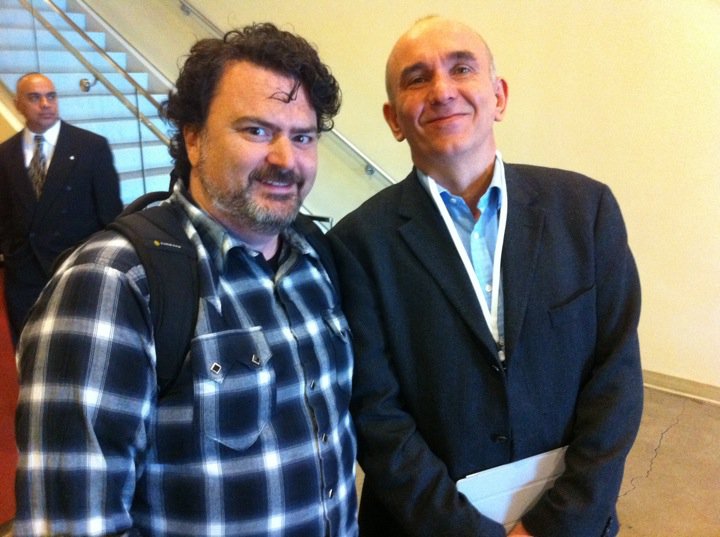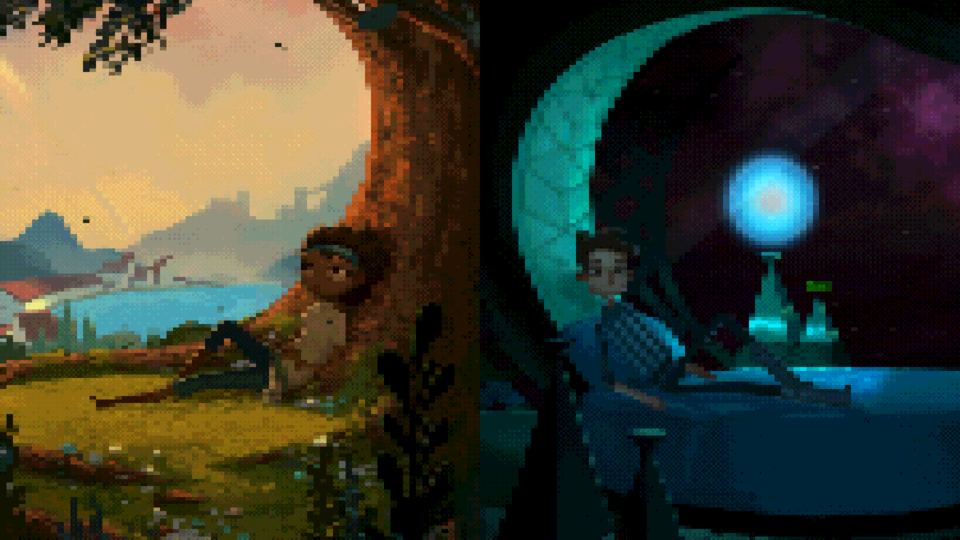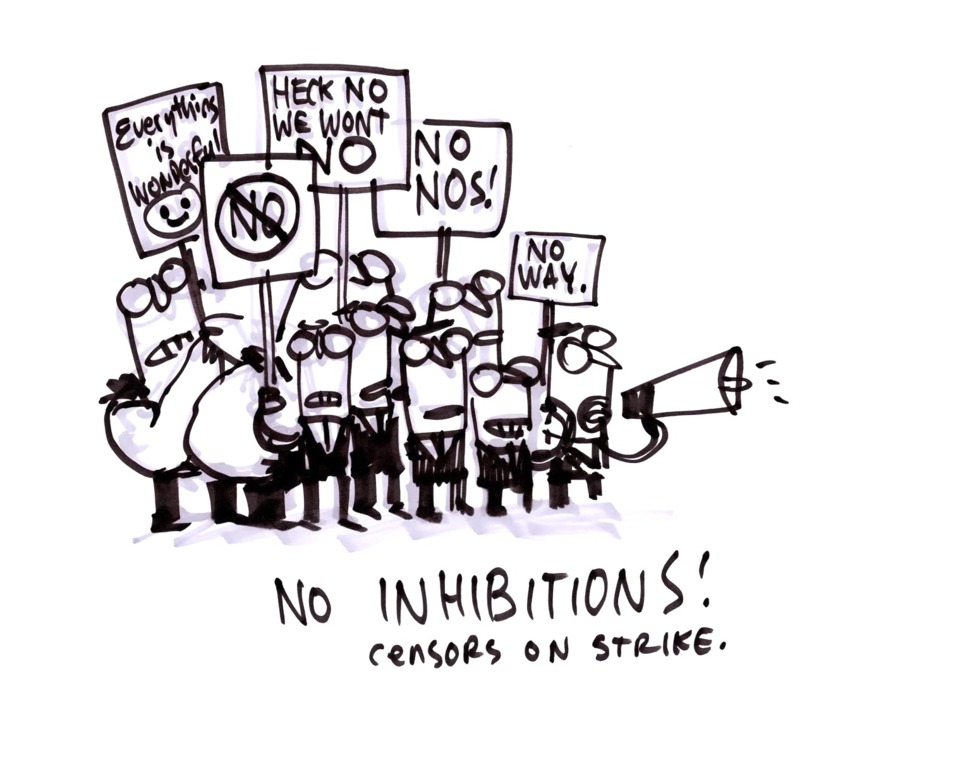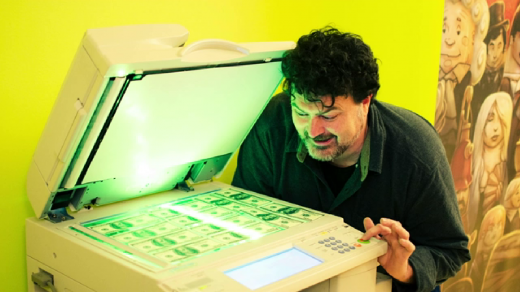After watching the huge Double Fine documentary about Psychonauts 2, I wanted to go back and watch the Broken Age one again. My memory no longer exists. I feel like I now have intimate knowledge of the development studio (I don't), especially since both documentaries constantly reference earlier footage. Those callbacks also established a history that I found increasingly bizarre. Yet, no one I've seen online has ever touched on it. Most people rave about how amazing it is to get dozens of hours of in-house footage and stop the train of thought there. To be fair, both documentaries are peerless and that praise is deserved.
There is, still, a vision of a studio you can get from seeing it being documented from its literal inception, which you'd otherwise only get from working there. A lot of times, the argument about criticism around studio culture is that "we're not seeing the full picture." Here, we kinda are getting the full spread of things. With every new scrap of footage and callback, there was a certain sentiment that kept being reaffirmed to me that I just need to get off my chest:
I think Tim Schafer might be a shitty boss?

You'll be able to use your pitchforks at the end; I understand. For now, let me explain my thought process. I don't mean that Double Fine is the same like the horror stories you hear from working at the nightmare factories of Blizzard or, heaven forbid, Ubisoft. In fact, I mean the literal opposite of that.
Schafer is an idealist, through and through. The man is all vibes and vibes are great. I think everyone would agree that Double Fine might be the best place to work in video games. Hell, there are several times that an employee relocates and Schafer finds a way to keep them on payroll. There are beer parties, free cake; the works. And that's not as in "pizza party" distraction bullshit; raises are included as well. I… It's all in the documentary that you should've watched before getting here.
There is, however, a limit to how much that spirit is benevolent or doesn't flip to being harmful. A lot of Schafer's management style centers around potential, rather than the tangible. There's a lot of wishful thinking of what could be, imagination on where a game will be down the line and a reluctance to look at a deadline realistically. At the same time, not every Double Fine game lives up to that initial dream. Brütal Legend notoriously wasn't what people expected. Broken Age is a pillar of documented compromises. We'll touch on Spacebase later. Massive Chalice, which I love, was criticized for its lack of depth. Rad; well, I think most people forgot it even exists.
The decades of wide eyes, big heart and its resulting development struggles reminded me of the infamous Rock, Paper, Shotgun interview with Peter Molyneux that starts by asking if the studio head is a pathological liar. Go back and read that harrowing interview, please. See how many parallels you'll find.

There are several times where Schafer laughs that every game they've ever made has been late, over budget, poorly scoped and so on. There's a lot of coping with humor. Psychonauts was so close to going over a cliff that the studio almost crumbled. Amnesia Fortnight, the in-house game jam, was born out of people working on Brütal Legend for so long that they needed to do anything else. Broken Age was first split up, then the second part got pushed back and then it got pushed back even more, as the studio scrambled to find more money than their legendarily successful Kickstarter campaign of over $3 million possessed. From the interview, Molyneux states:
"If you go back and look at every single game I've ever worked on, ever, other than Fable 3, they've all taken longer."
Hell, Molyneux even used Double Fine as a crutch in that same interview. At one point, Schafer shows off his notebook with ideas. In the book are several different pages with hundreds upon hundreds of names, before getting to Broken Age. The process, like every step in the founder's playbook, took ages to get to a conclusion. It takes so long that some episodes feature a mock logo. Perfectionism works great for an end result, but I'd argue that you don't need to write down hundreds of names to come up with something as elegantly simple as Broken Age. It's no Grim Fandango, I get it, but what is?
At the same time, this idealism burns through more good will than I've ever seen. Double Fine, at the time, set a record for Kickstarter successes to fund Broken Age. After that momentum collapsed, Kickstarter became much harder to fund projects. You barely ever hear from a crowdfunding success story anymore. Double Fine made out, but every developer behind them had to live in the wake of its success and the resulting "Kickstarter fatigue" its gold rush instigated.

Then, there's Spacebase DF-9. After crowdfunding one way for Broken Age, Double Fine shifted to Steam Early Access, which was new at the time. While Spacebase is developed in tandem with Broken Age, it isn't explicitly mentioned in the documentary. Well, the project anonymously shows up once: A "game" gets canceled and twelve people get fired as a result. That game is Spacebase. Double Fine had gotten all the money they were going to get from Early Access and had to make the call to can it. This decision came at the cost of consumer dissatisfaction, but more importantly, the jobs of a dozen people. That's not just under-delivering; it's being plain reckless. The move was aptly criticized by the developers of Project Zomboid, who pointed out that everyone else will suffer, while Double Fine can once more just wash its hands of it all:
Failures tarnish the reputation of the entire model, so a failure (particularly a high-profile failure) is potentially damaging to the very developers who need this model the most.
For Psychonauts 2, crowdfunded in yet a new avenue to prevent the previous ties, the company brought in Zak McClendon as a more practical producer, to remedy the game trailing to infinity. Think of him as The Benz. Somewhere over the middle point of development, McClendon is fired for not gelling with the team's creative spirit. The producer mentions that he is seen as a "stepdad" and that he "could" put his foot down on creative decisions to speed up the process, but he didn't want to fall out of step, for what good that eventually does him. The documentary paints Zak's storyline as a villain and, as transparent as the footage gets, the man's exit is shuffled behind closed doors. You see what they want you to see, after all. It really feels like McClendon gets the short end of the stick, as the whole reason they exist is to prevent what will eventually happen to Psychonauts 2 and every other Double Fine game: Everyone is waiting on Schafer to get his head out of the clouds and settle on what actually needs to happen. Schafer is not the one that will budge. That's the perk of being at the top. Eventually, the crowd money evaporates, again, leading the company to get acquired by Microsoft, to once more prevent them from going broke over not getting a product up and ready. That's a pretty crazy turnaround, when you put the firing and the delay side to side.

Schafer just seems incapable of time and/or resource management, which cuts both ways. At the start of Broken Age, he mentions that it's too early to be thinking of what isn't possible, leaving the game in a fugue state. That stretch lasts for years. For Psychonauts 2, one of the designers mentions that the game is constantly in the last four months of development, for years, which puts people in a near-constant pressure cooker. The same employee gets put through a "trial by fire" when first starting, as admitted by McClendon. The entire level that the designer was asked to create gets scrapped and remade, as do others, while the studio figures out what they want to achieve. Throughout its existence, the sentiment of the studio is that it's always at the precipice of catastrophic closure and it's time to sink or swim. For Psychonauts that execution was avoided with heavy crunch. Broken Age crunched to the point that someone caught pneumonia; eventually signing publisher deals the studio was initially against. Psychonauts 2 solves its issues by becoming part of the Xbox ecosystem.
You'd think that this last, permanent solution would put Double Fine out of its misery, before its string of troubled actions would come to a head, the same way it did for Molyneux. The former Bullfrog founder now makes NFT garbage, by the way. Yet, this is the hurdle that I fell on. I just don't live in this idealistic world. You can only assume Double Fine can now dream endlessly, as it always has, until Microsoft puts its thumb on the studio. The platform holder not only can, but has historically already cut throats, when it comes to their products not meeting expectations.
In 2014, Microsoft made a big deal about announcing the return of their multiplayer game, Phantom Dust. Initially, the remake was going to cost $5 million, but that's before the execs wanted to add a singleplayer campaign and even talked about it being a "JRPG" of sorts. A bloated scope is a universal game dev experience. Only a year later, Phantom Dust was canceled and the studio behind it had to fire everyone. In an interview, one of the developer's employees stated that they asked Microsoft for $2 million more to make what they themselves had pitched, but that the company wouldn't budge and just callously canned everything instead. In the scale of things, $2 million isn't that much, especially for a company that throws around a $68.7 billion acquisition. Hell, it's less than either of Double Fine's crowdfunding efforts. And that's for a game that Microsoft made a big stink about. It would be delusional to think that this crush wouldn't also eventually happen to Double Fine, if they don't rectify decades of indecision.

Of course, I can only feel this dread because Double Fine allows us to peer behind the curtain to a lot, though not all, of its goings-on. You could read this and think the studio could just as easily rescind this courtesy. I'll refer to the interview one more time. You really should go back to read it all, as it is uncanny in its similarities: Molyneux threatens to no longer talk to the press. The interviewer responds:
There's a massive gap between not overpromising and taking your ball and going home.
To put it bluntly, I think it will be hard for Schafer to come to a realization before it's too late. The man has operated a certain way for decades and even when other employees, like McClendon (but not limited to him) try to shift direction, it isn't the founder that's left holding the bag. Old dogs, new tricks. Additionally, the games that do end up hitting are quickly seen as ends justifying the means. Everyone loves Psychonauts, so the process is all water under the bridge. And, if not, then just leave and work somewhere that isn't all bar crawls and free dinners. Sink or swim. Just like at Blizzard or Ubisoft. Roll with the punches of a tyrant or a lovable goofball that scribbles in a notebook, like a child draws on a school desk, until a deadline forces progress. Work under the sword of Damocles, because that's a poetic endeavor or whatever. I only see a marginal difference there. I see the same quixotic behavior that Molyneux was railed for, except that he didn't make an excellent series of documentaries about it.
I love that the documentaries exist. Unfortunately, as much as Schafer's idealism skews positively, my thoughts point decidedly negative. It would be great if the current world of massive, industry-wide layoffs and economical crises didn't ruin the end of the rainbow for me. I just don't see a lot of scenarios where Schafer's lengthy history of going over budget, over scope and past date doesn't eventually come crashing down and not in the way that makes for a throwaway joke at a later date. You could argue that this time has already occurred for the turnover of employees that are no longer there. Should that happen, there's always more good will to burn. The man is very charismatic; dreamers often are.

If you are Tim Schafer and you read this: I'm sorry, sir. I do love Double Fine and I think the games are unlike any other. To make matters worse, you just mentioned that going to DICE gave you COVID, despite wearing a mask. My timing is as awful as my train of thought. Get well soon, Tim.
Making games is hard.
Log in to comment